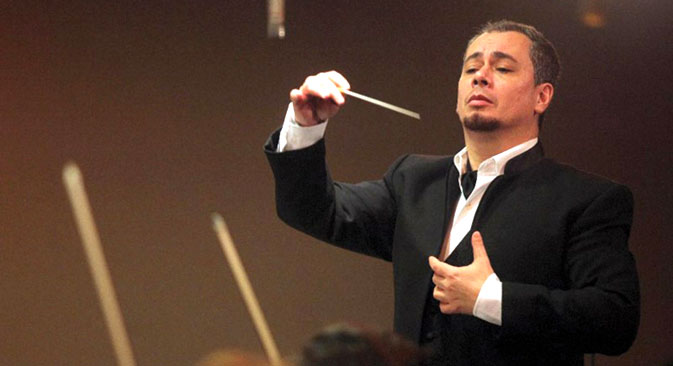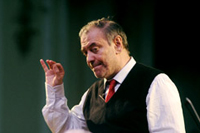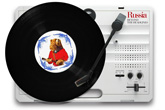Vladimir Lande’s musical bridge

Vladimir Lande performs in both the United States and Russia, dividing his time between them and engaging with both countries. Source: Press Photo
Conductor, oboist and pianist Vladimir Lande has made a name for himself playing beautiful music in his native Russia and adopted United States.
But that’s not all he’s doing. He is also working to connect the two countries in new and meaningful ways through music education and dynamic performances. His accomplishments on the world stage have shaped him as a dynamic individual with unique perspectives on the arts and on the natures of Americans and Russians.
A native of Leningrad (now St. Petersburg), Lande comes from five generations of musicians. His mother taught him to play the piano as a 5-year-old. At the age of 14, he began to learn the oboe.
“I especially liked the sound of the oboist in the Leningrad Philharmonic. The sound was so beautiful, and I really wanted to sound the same,” Lande told Carol Reynolds, a specialist in music education and Russian music, in an interview.
As a second-year student at the Leningrad State Conservatory, Lande was invited to audition for the Leningrad Philharmonic Orchestra. He played with the orchestra from 1984 to 1989, performing with leading musicians under the direction of legendary conductors such as Yevgeny Mravinsky and Valery Gergiev.
P. Tchaikovsky: Violin Concerto in D Major, Op. 35. St. Petersburg State Symphony Orchestra. Vladimir Lande, conductor. Tianwa Yang, violin. Source: YouTube / Naxosvideos
The environment “influenced me greatly from the very beginning,” Lande told Reynolds. “Being so young, being surrounded by the most professional and charismatic players of that time in the orchestra, conductors like Mravinsky were like gods.”
In 1989, Lande left the Soviet Union for the United States. Because he had listened to American jazz music in Russia, when he came to the U.S., “the approach to music was not so dramatically new or different from what I grew up listening to,” he said. Lande began to perform in several American orchestras and was readily accepted thanks to his talent with the oboe.
In 2004, Lande conducted the opening concert of the White Nights Festival in St. Petersburg, and in 2006, he made his debut with the Baltimore Opera Orchestra. The same year, at the invitation of a Russian colleague, he began to work closely with the St. Petersburg State Symphony Orchestra.
Today, he performs in both the United States and Russia, dividing his time between them and engaging with both countries. He is the principal guest conductor at the National Gallery of Art Orchestra and the Washington Soloists Chamber Orchestra in D.C.
Bruno Nasta, jazz violinist and personnel director of the National Gallery of Art Orchestra who has worked with Lande for 25 years, describes his conducting style as “sensitive and caring in his interpretation of the music.”
He added, “Vladimir permits a lot of freedom to the musicians to interpret, but adds what he needs to get what he wants out of a piece. Technically he’s one of the best I’ve seen. He has so much charisma from the podium, and the instrumentalists can sense it.”
In 2009, Lande organized the Contemporary American Music Festival in Washington, D.C. From 2009 to 2010, he led the St. Petersburg State Symphony Orchestra in a tour through Europe, and brought the orchestra to the United States in 2011 to perform with the National Gallery of Art Orchestra. Combining the orchestras in performance allowed him to see how Russian and American musicians communicate, he said.
“It was very fun to watch the musicians work together and how they relate to one another and communicate, ask each other questions, and agree or disagree,” Lande said.
Lande on Tour
Nov. 29 and 30: The Nutcracker with the Donetsk Ballet, Ballet Caliente, and COSMIC Symphony in Huntingtown, Maryland.
January 2015: Tour in the U.S. with the Saint Petersburg State Symphony Orchestra. In program: Rimsky-Korsakov, Shostakovich.
Jan. 11: Concert at the National Gallery of Art in Washington D.C.
Lande captivated Russian audiences in October 2014 when the St. Petersburg State Symphony Orchestra traveled to three Russian cities performing American composer George Gershwin’s “American in Paris,” “Rhapsody in Blue” and “Porgy and Bess.”
“Gershwin’s music is something that gives Russian audiences both experiences at the same time: they hear very lyrical, almost Russian-like melodies and lyrical harmonies,” Lande said. “Russians react positively when they feel that an artist really loves the character and puts their heart into it and makes it their creation.”
Kevin Short, an American bass-baritone who traveled with Lande on the tour, called the concerts “a vivid display that music is the most unifying language we humans possess.”
Despite Lande’s ability to connect people through music, he has not been immune to the effects of the crisis in Ukraine. At a concert in the spring, a few audience members accused him of playing for Ukrainians who were attacked by Russians.
“I told them that I play for all people who are suffering. They turned around and marched out,” Lande said. “It was a small incident, but it showed that they related the music to their own experiences. Music can reach everyone’s soul, and relate to everyone’s emotional shades and colors.”
Feeling that speaking to the audience is as important as performing, Lande gives lectures before performances and takes every opportunity to educate the audience about what he is playing. He wants artists to take a lead role in seeking to understand how the world should work and creating a space for dialogue. He also sees opportunities for the arts to transcend political tensions between Washington and Moscow.
“Multicultural fluency is one of Vladimir’s strongest attributes,” said Lande’s colleague, Bob Lord. “His experiences growing up in Russia and subsequently flourishing musically on a worldwide stage have made him a highly effective ambassador for Russian culture. We’re all a product of our times, but Vladimir’s view extends far into the past and, I believe, far into the future as well.”
All rights reserved by Rossiyskaya Gazeta.
Subscribe
to our newsletter!
Get the week's best stories straight to your inbox

